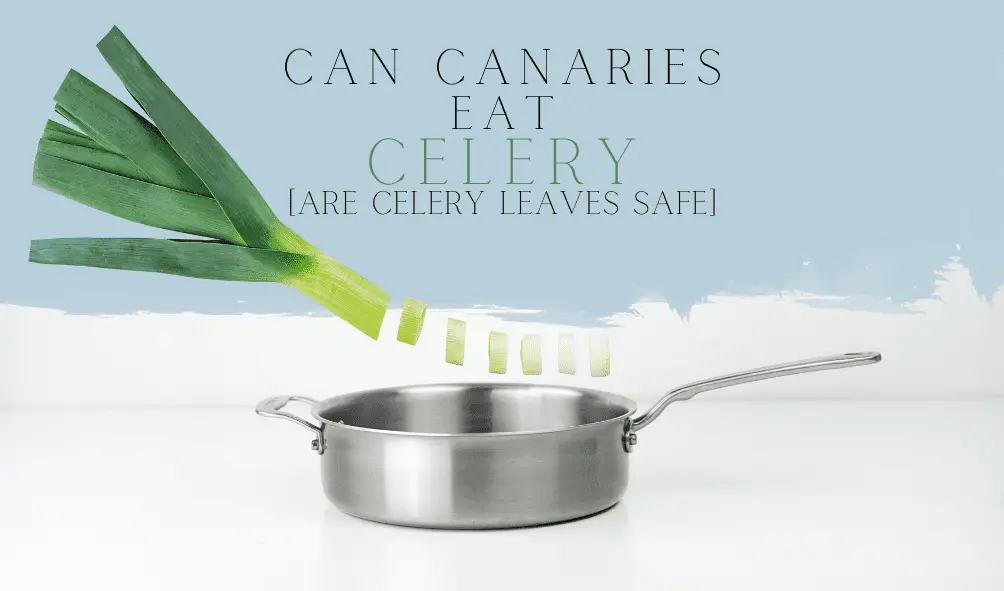Short and sweet answer. Canaries can eat celery! The high water content in celery is great for keeping canaries hydrated and has great vitamin and mineral properties to add to the mix! Celery makes for a great healthy snack that has little to no side effects! Although, everything has a downside which we will talk about in a minute!
From high water content to potassium, which helps retain water, this vegetable is great for adding a few benefits that your canaries’ main diet can sometimes lack! Each vitamin and mineral I will go over has incredible benefits that can do amazing things for your bird!
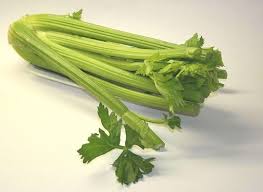
Although fruit and vegetables are only meant to be fed in moderation, try to change it up on a day-to-day basis for your canary to get the full effect of all the many different fruit/veg out there!
Here is an article that you might like! “Can Canaries Eat Strawberries (Everything You Need To Know)” Take your bird on a taste adventure!
Table of Contents
- Can Canaries Eat Celery?
- The Health Benefits Of Celery For Canaries
- How Much Celery Should Canaries Have?
- Can Canaries Eat Too Much Celery?
- Can Canaries Eat Celery Leaves
- Five Foods Canaries Shouldn’t Eat!
- The Dirty Dozen
- The Recap
Can Canaries Eat Celery?
Celery is great for canaries! Not only can they eat celery, but they will benefit from it greatly! From the high water content to Vitamins A, C, and K as well as potassium and folate! Celery is a great healthy snack for your canary to be fed from time to time!
*Read on to find out if canaries can eat celery leaves!*
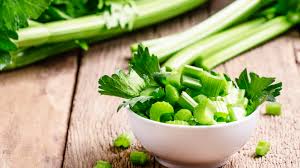
We will cover each vitamin and mineral individually and how they actually help your Feathery friend. From stress-reducing factors from vitamin C to preventing overgrowth of beaks and nails from vitamin A! This incredible vegetable has a lot to offer!
Let’s get Into the benefits:
The Health Benefits Of Celery For Canaries
Having pellets being the only food your canary eats is not going to cut it. So feeding your bird other nutritional foods is going to be necessary! Here is why celery should not be skipped when considering what to feed your bird as a healthy snack!
Here is a list of the vitamins and minerals that celery has and why this vegetable does wonders for your canary: Vitamin A, C, and K, as well as Potassium and Folate!
Vitamin A
- A deficiency of vitamin A leads to the overgrowth of your bird’s beak and nails! Make sure to keep these levels in check!
- Not only does a deficiency of vitamin A lead to overgrowth, but also chipping and flaking of the beak and nails. If left unchecked, this could lead to their nails and beaks breaking (which isn’t pleasant)
Vitamin C
- This is an important vitamin for your canary to have. Vitamin C is great at reducing stress.
- Having a Vitamin C deficiency can be detrimental to your little guys’ overall mental health.
- Vitamin C is great for the immune system and creating antibodies! Which will keep your birdie healthy!
Vitamin K
- Vitamin K helps coagulate blood! Hopefully, your bird doesn’t get a cut, but vitamin K helps to clot the blood and slow down the bleeding if the worst does happen.
Potassium
- Potassium is great for aiding the speed of their metabolism, as well as helping strengthen bones.
- This mineral is great for reducing blood pressure while at the same time helping to retain water!
- High Potassium diets help prevent strokes as well as keeping diseases like osteoporosis and kidney stones at bay.
Folate
- Folate is needed to make red and white blood cells in the bone marrow. This helps protect against illnesses and carries nutrients around the body.
- Folate is responsible for converting carbohydrates into energy and keeping your bird chatty and playful!
- Not only is it important during infancy but during pregnancy too! Folate is a fantastic vitamin that is responsible for the rapid growth they experience during adolescence.
How Much Celery Should Canaries Have?
The great thing about celery is you can’t really feed your bird too much of it in the sense that it will have negative side effects like oranges or grapes. But canaries are still quite small, so their size does need to be taken into account so that they still have room for pellets!
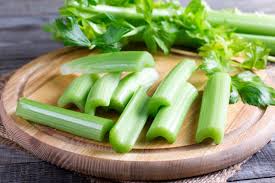
Remember, Celery is a snack and not a meal replacement!
Now, How much celery should canaries eat? Once you have rinsed and de-leafed your celery stick, I would recommend no more than 2-3 cm of a celery stick as this should be ample for your bird to have as a snack!
Any more than this, and you risk wasting space for more important foods like pellets that should cover the majority of their diet.
As a Quick Recap:
- Roughly 2-3cm of a celery stick as a snack.
- Rinse, De-seed, and De-leaf your celery before. (find out why in the next sections!)
- This will keep them satisfied until their next meal.
Can Canaries Eat Too Much Celery?
Canaries can eat too much celery in the sense that it would ruin their well-balanced diet and may even upset their little tummies! Which may lead to a “watery” clean-up (Which no-one wants). Celery is 95% water, so the risk of turning their stool into a liquid mess is there.
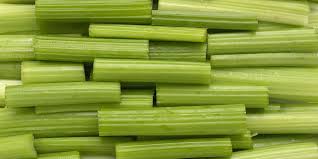
Not to worry, as this is an easy fix that doesn’t usually require a vet. Here are some steps to harden things up again.
- Reduce the amount of watery food your canary is eating.
- Feed your canary food that is higher in fiber, like pellets, as they are dry.
- Continue this for a day or two, and their stool should get back to normal in no time.
Quick reminder: Don’t completely cut off all watery foods. Just reduce it and add more fibrous food. Your bird still needs water to run their bodies correctly.
Can Canaries Eat Celery Leaves
Celery Leaves may be covered in pesticides. To be safe, I usually de-leaf my celery first and then rinse the sticks to eliminate any unwanted pesticides that may still be on them from the farms.
Buying organic produce is a great way to reduce pesticides but not always 100% free from them. So regardless, I always rinse my fruit and vegetables before use. Plus, this adds a fresh watery taste to the food that birds absolutely Love!
Five Foods Canaries Shouldn’t Eat!
Granted not everything on this list is food, but will probably be news to you if you weren’t told or looked into it specifically.
To start off this list of Five:
Eggs:
Stay away from eggs where ever possible, as eggs lead to clogged arteries and possibly life-threatening health conditions.
Teflon:
Birds have a keen sense of smell! Ideally, you want to have your canaries cage positioned in an open space away from the smoke of the kitchen and fragrances of Air fresheners.
Many kitchen pots and pans are made from Teflon, which usually is no big deal to humans. However, if overheated and burnt, Teflon emits harmful poisonous gas for birds, and in some serious cases, with no ventilation, it can cause some serious respiratory issues.
Human Processed Junk Foods
It may seem obvious but human junk foods need to be included on this list as some foods that we produce are incredibly toxic for your bird. We all think “Ah, one bite won’t hurt” but your canaries’ tummy is in no way equipped to handle some of the food we make.
Instead of giving your birdie a bite of the food, you find delicious. Find a natural, GMO-free fruit or vegetable for your bird to snack on! Everyone wants their bird to be healthy in all aspects of life, they will appreciate it!
Chocolate/Caffeine
Now, these next two. I’ve decided to combine them as chocolate contains small amounts of caffeine. I’m fully aware that chocolate and caffeine are man-made, but they truly do deserve their own paragraphs.
The reason chocolate and caffeine are so dangerous is all due to the size and strength of your canaries heart. Birds are only little creatures and really can’t handle the heart palpitations that coffee creates.
Have you ever had anxiety due to the feeling that your heart isn’t beating properly thanks to coffee? (I know I have, although it might be the long nights writing articles and endless cups of coffee)
Please try to remember those feelings next time you think it’s okay that they have a quick drink.
The Dirty Dozen
A CNN article linked “here” says, “After strawberries, the “dirty dozen,” in order, are apples, nectarines, peaches, celery, grapes, cherries, spinach, tomatoes, sweet bell peppers, cherry tomatoes, and cucumbers.” This article is definitely worth a read!

In short, remember to wash your celery first to get rid of any nasty pesticides that could be harmful to your canary! Buying organic can help reduce this, but I usually wash them regardless, to be sure!
Which leads me onto my last and final section.
The Recap
If you’ve made it to the end and are now reading the recap! Thank you. In this section, I like to cover the article’s highlights and go over the necessary information!
Can Canaries Eat Celery?: Canaries can eat celery! The high water content in celery is great for keeping Canaries hydrated and has great vitamin and mineral properties to add to the mix! Celery makes for a great healthy snack that has little to no side effects!
The Health Benefits Of Celery For Canaries: The list of the vitamins and minerals that celery has, does wonders for your canary: Vitamin A, C, and K, as well as Potassium and Folate!
How Much Celery Should A Canary Eat?: Once you have rinsed and de-leafed your celery stick, I would recommend no more than 2-3 cm of a celery stick as this should be ample for your bird to have as a snack!
Can Canaries Eat Too Much Celery: Canaries can eat too much celery in the sense that it would ruin their well-balanced diet and may even upset their little tummies! Which may lead to a “watery” clean-up (Which no-one wants). Celery is 95% water, so the risk of turning their stool into a liquid mess is there.
Can Canaries Eat Celery Leaves?: Celery leaves may be covered in pesticides. To be safe, I usually de-leaf my celery first and then rinse the sticks to eliminate any unwanted pesticides that may still be on them from the farms.
Any Questions you have relating to this article or just for me in general, leave a comment down below in the comments section.
Disclaimer: I am not an expert. Some parrots may react differently to different fruits. Please make sure you always slowly introduce a new food into their diet and keep an eye out for any adverse reactions. If your pet does start displaying symptoms of an adverse reaction, please contact your vet for advice.
